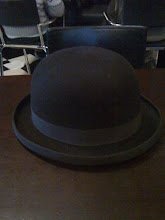.jpeg)
Well, it does.
We're well aware of the standard ur-setting that fantasy authors tend towards - medieval, quasi-European. Probably akin to either a) Tolkien's Middle Earth or b) Robert E. Howard's Conan stomping grounds. Or a violent, pointy-eared offspring of the two. Or urban fantasy. These works are not to be dismissed out of hand, for a skilled author can make even the most cliche premise awesome with the right sort of zazz. (If you'll forgive the term.)
But you know, honestly, if an author even keeps the magic and just uses another place or era for the basis of the setting, she or he can make their story plenty more interesting even if they're not the most fantastic of authors.
Steampunk is an excellent example of this, especially as I firmly consider the subgenre to be fantasy, not science fiction. (The only reason most examples of it are shelved with the scifi is because it wouldn't exist without Jules Verne and he's been grandfathered into the larger genre because they didn't know the stuff in his books was impossible at the time. I make an exception for Neal Stephenson's Diamond Age because it's actually set in the future.) Victoriana can be used without the steampunk tropes, though, and used effectively.
Why limit yourself to just the nineteenth century, though? Authors, both would-be and otherwise! You have the entire march of history to work with! With many fine historians and archaeologists having done the lion's share of work providing you with the details of practically any past world that catches your fancy, it's worldbuilding made easy.
Imagine, if you will. Paleolithic fantasy. Canadian fantasy (and no, I don't mean urban fantasy set in Ontario, with respects to Charles de Lint). Russian. African. Motherlovin' Aztec. Or Inca. Or Mayan. The mere thought of such settings sparks my imagination and distracts me from projects I'm already determined to see to completion.
History can even make the standard setting better, giving one a better sense on the grand scope of it - how things kept happening, how technologies kept evolving, even if according to our stereotypes, they spent a long time standing still on that front. They were using cannons during the Hundred Years' War, remember. The art of shipbuilding was continuously adjusted until they had vessels that could make a transatlantic crossing, remember. Firearms cropped up in the 1300s, remember. And the moveable type printing press? Fifteenth century!
What did they eat? Where did they live? What was their philosophy? Their religion? Their livelihood? What did they celebrate? What was their government? Their view of their own history? Their ideal man? Their ideal woman? Every culture, both past and present, had and has their own answers to these questions and even one differing answer can make one hell of a story. Read about them, learn, and be inspired.
To finish, here is a brief and woefully incomplete list of otherwise-settled fantasy novels.
Steampunk:
Boneshaker, by Cherie Priest
Mainspring, Escapement and Pinion, by Jay Lake
Court of the Air, Rise of the Iron Moon, Kingdom Beyond the Waves and Secrets of the Fire Sea, by Stephen Hunt
Whitechapel Gods, by S.M. Peters
Asia:
Green, by Jay Lake
The Tales of the Otori series, by Lian Hearn
Middle East:
In the Night Garden and In the Cities of Coin and Spice, by Catherynne Valente
North America:
The Thirteenth Child, by Patricia C. Wrede
The Sharing Knife series, by Lois McMaster Bujold
(Note: It would be nice to find some fantasy based on Native history without the colonials sticking their noses in. Anyone know of any?)
Elizabethean:
Midnight Never Come, by Marie Brennan (Its sequel, In Ashes Lie, is set during the Restoration.)
Ink and Steel and Hell and Earth, by Elizabeth Bear
Regency:
Jonathan Strange & Mr. Norrell, by Susanna Clarke
The Magicians and Mrs. Quent, by Galen Beckett
Victorian: (Not quite steampunk!)
Freedom & Necessity, by Steven Brust and Emma Bull
France:
The Cardinal's Blades, by Pierre Pevel
The Privilege of the Sword, by Ellen Kushner
The Phoenix Guards and Five Hundred Years After, by Steven Brust (well, it's a pastiche of Dumas)
Greece:
Lavinia, by Ursula K. Le Guin
Also, practically everything written by Guy Gavriel Kay, with the exception of The Fionavar Tapestry. I say this even though I've mixed feelings about his work; many people with good taste enjoy it, so there you are.
My challenge to my readers (I know of two of you) is this: think of a history book you've read. Or an anthropology or archaeology book, if you're fancies run that way, for they certainly can be included in the larger thrust of my argument. Think of a fantasy story that could be written based on that book. Imagine how awesome it could be. Beccarae, I'm thinking specifically of The Ghost Map for you, because I know it could be amazing. Write your ideas down if you want to and have the time.
But at the very least, just think about it.

To be fair to Howard, many of his Conan stories are set outside the quasi-Medieval setting of the Hyborian kingdoms. Some are set in the Middle-east ("The Devil in Iron," "Iron Shadows in the Moon," "The People of the Black Circle") or Ancient Africa ("Red Nails," "The Servants of Bit-Yakin," "Queen of the Black Coast").
ReplyDeleteThe Hyborian Age's greatest strength is the merging of different time periods ("Black Colossus" - Medieval versus Pharonic Egypt, "Beyond the Black River" - High Medieval versus Native Americans, "The Black Stranger" - Pirates versus Native Americans versus Renaissance).
I too feel fantasy authors rely overmuch on the "Medieval model." Fantasy before Dungeons & Dragons was far more varied. A. Merritt's The Ship of Ishtar and Clark Ashton Smith's Hyperborean stories are both based heavily in the Mesopotamian milieu, for example.
Have I told you that I love you lately? I now have a to-read lust!
ReplyDelete